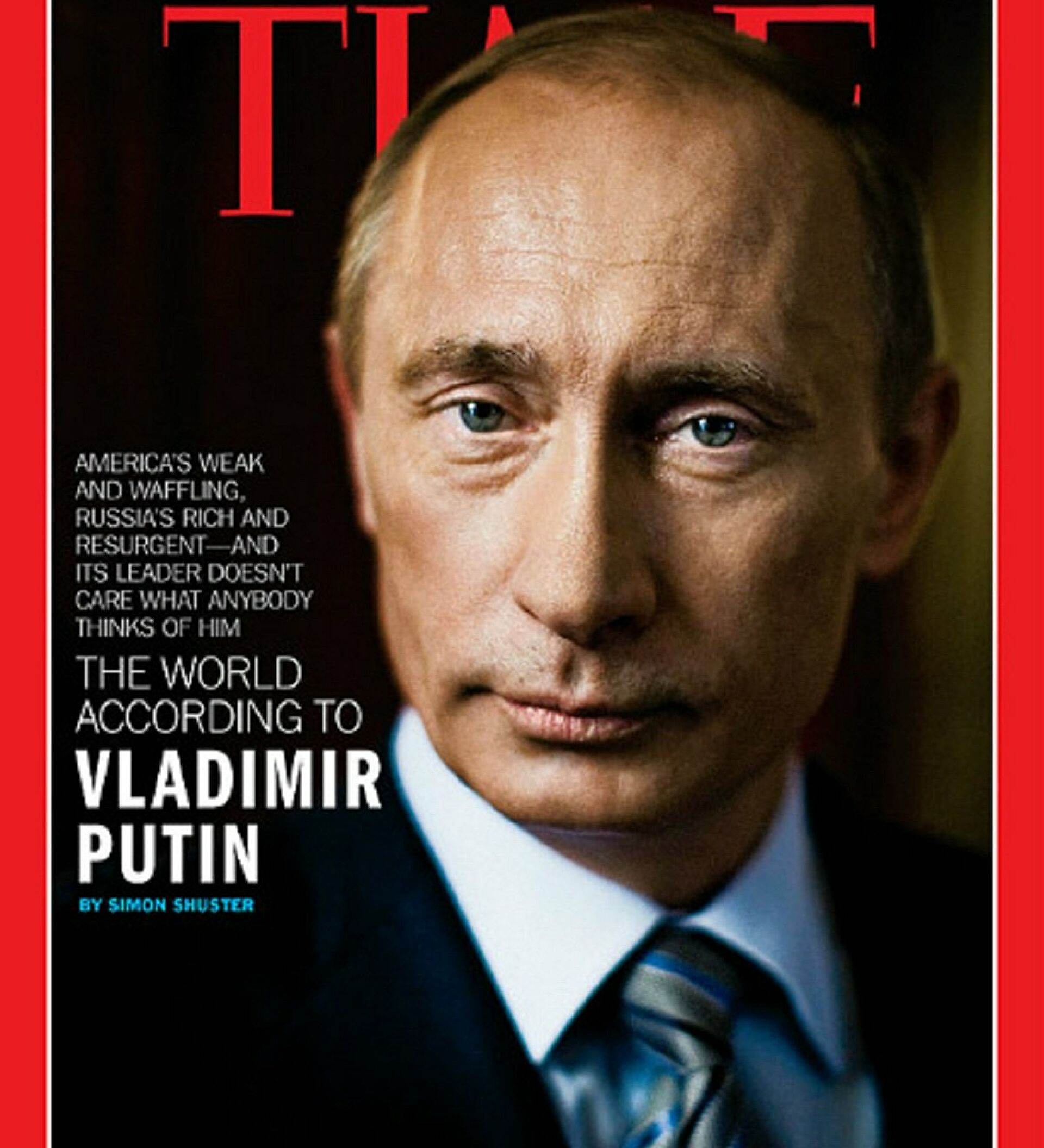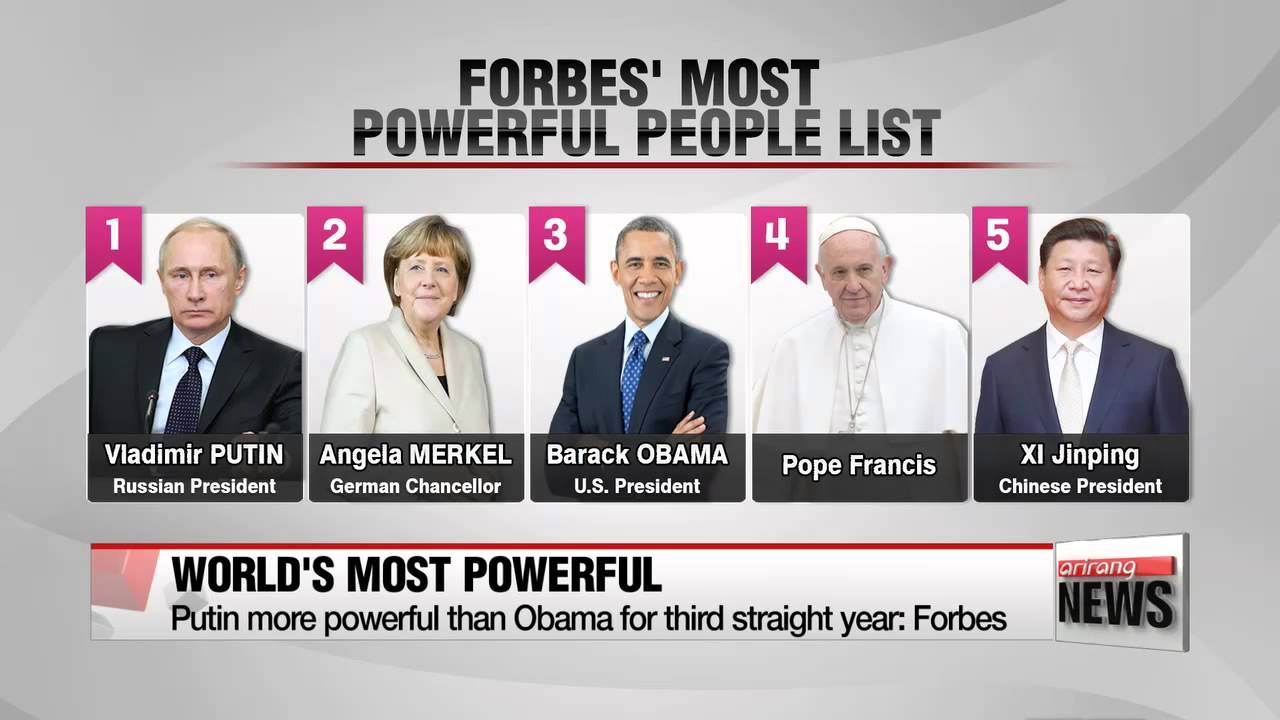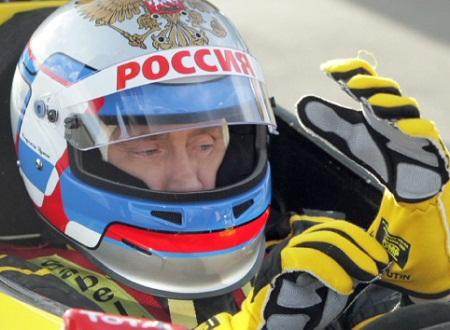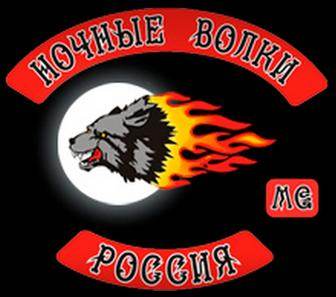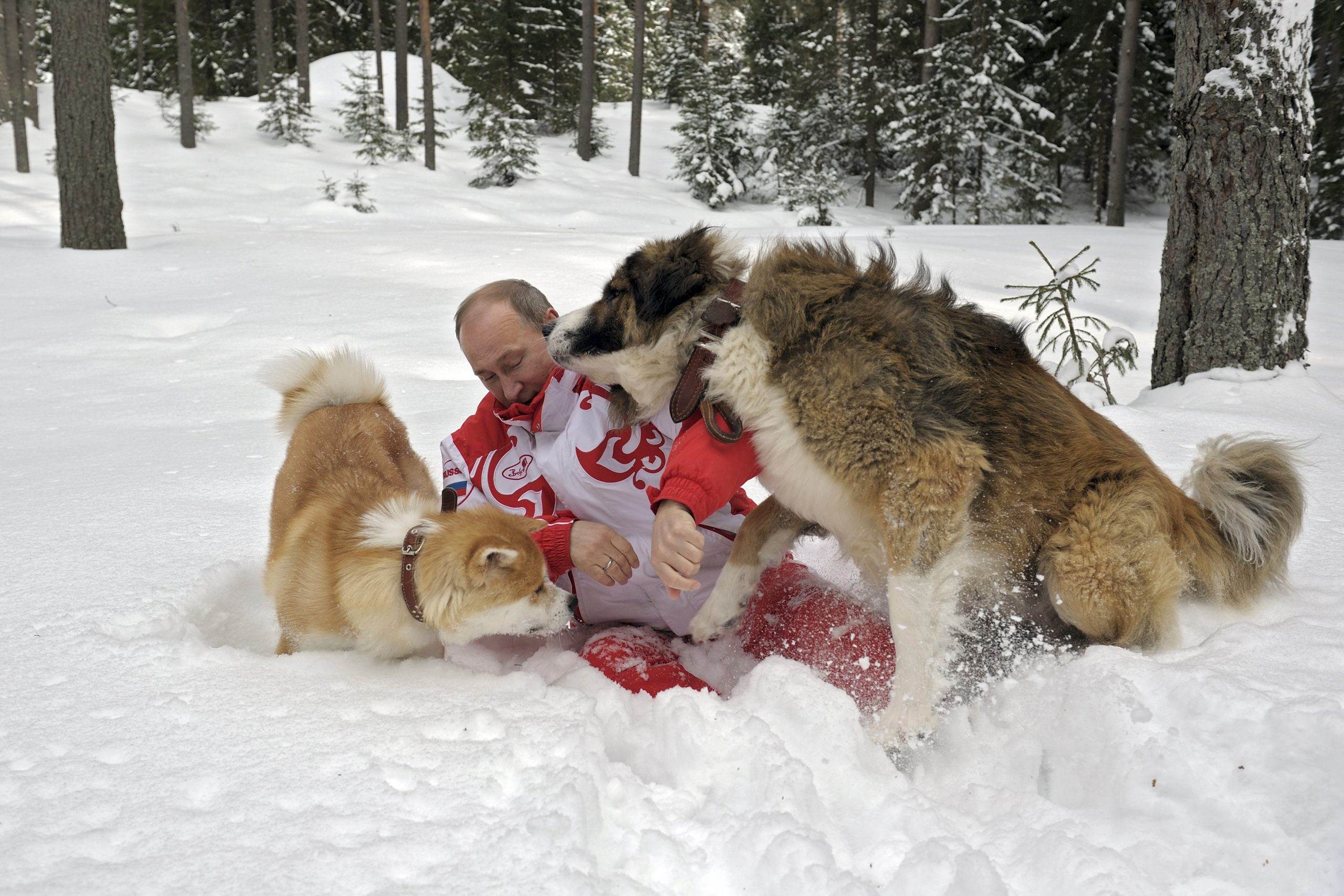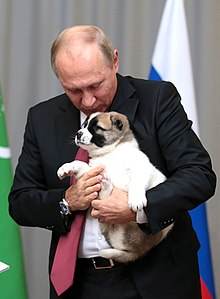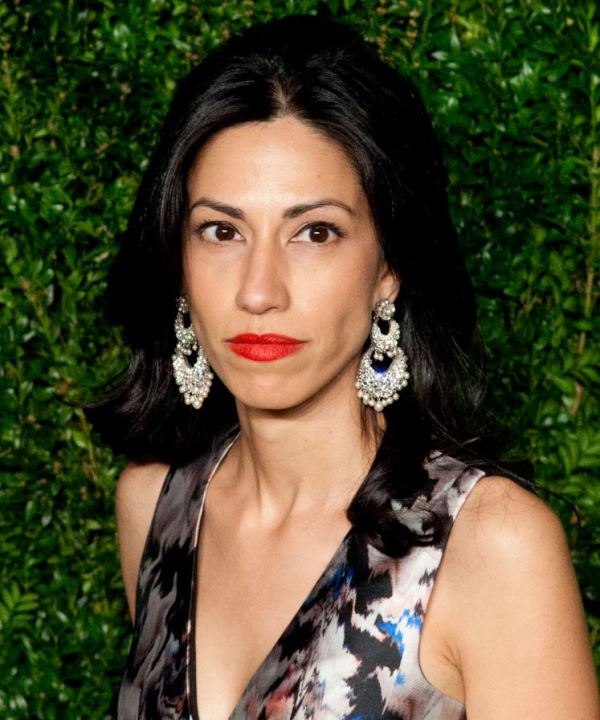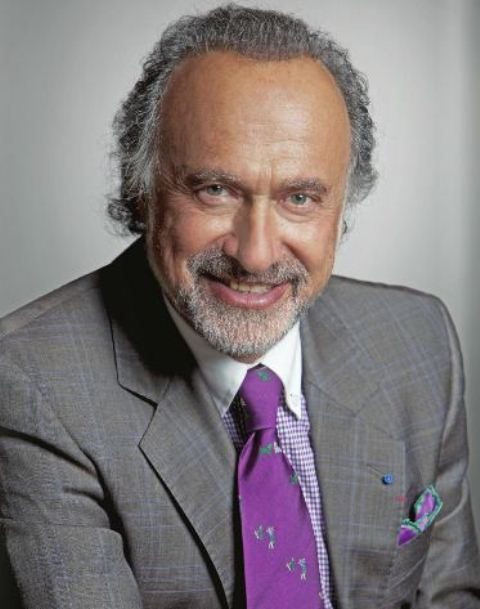Vladimir Vladimirovich Putin is a Russian politician and former intelligence officer. He is the current President of Russia. In addition to holding this position from 1999 to 2000, he again became the president in 2008. It was until 2012 that he served as the Prime Minister. Vladimir Putin holds the record for the second longest-serving European president.
Wiki/Biography
Vladimir Putin was born on October 7, 1952, in Leningrad (now Saint Petersburg).
In 1999, during his time in KGB, Putin worked for 16 years, reaching the rank of lieutenant colonel. He moved to Moscow in 1996 to become a member of President Boris Yeltsin’s administration. In August 1999, he was appointed Prime Minister after brief stints as Director of the Federal Security Service (FSB) and Secretary of the Security Council.
Vladimir Putin turned Russia into an authoritarian state. Russia is generally not considered a democracy. The fact that political opponents are imprisoned and repressed, that the free press is intimidated and stifled, and that the elections are not considered fair and free are among the reasons given.
Physical Appearance
Height (approx.): 168 cm/ 1.68 m/ 5′ 6″
Weight: 71 kg / 152 lbs
Eye color: Blue
Hair color: Salt and Pepper
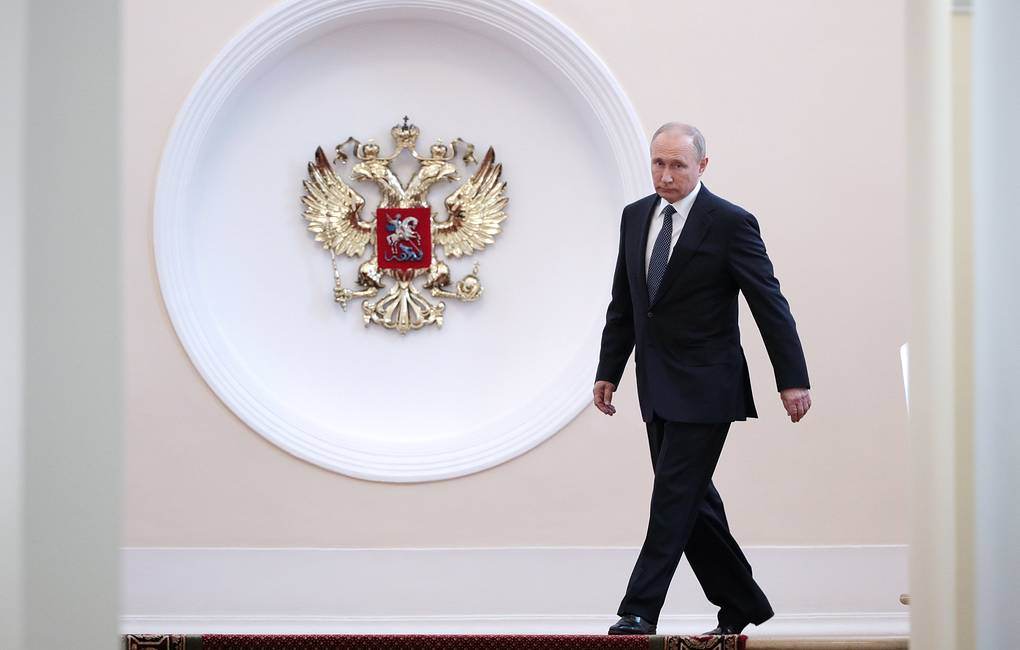
Family and Ethnicity
Putin is an Orthodox Russian. His mother was a devout Christian who attended the Russian Orthodox Church, while his father was an atheist. Despite government persecution of her religion at the time, his mother attended church regularly even though she did not keep any idols or images at home. When Putin was a baby, his mother secretly baptized him, and she took him to church regularly.
According to Putin, his religious awakening began after a serious car accident involving his wife in 1993, and the fire that burned down their dacha in August 1996. Putin’s mother gave him his baptismal cross before an official visit to Israel, urging him to have it blessed. Putin states, “I did as she said, then I put the cross around my neck. I have never taken it off since.”
When asked in 2007 if he believed in God, he replied: “…There are things that I believe, which should not, in my position, at least, be shared with the general public for everyone’s consumption because it would look like self-publicity or a political striptease.” Rumor has it that Putin’s confessor is Russian Orthodox Bishop Tikhon Shevkunov. Sergei Pugachev, his former adviser, rejected the sincerity of his beliefs in Christianity.
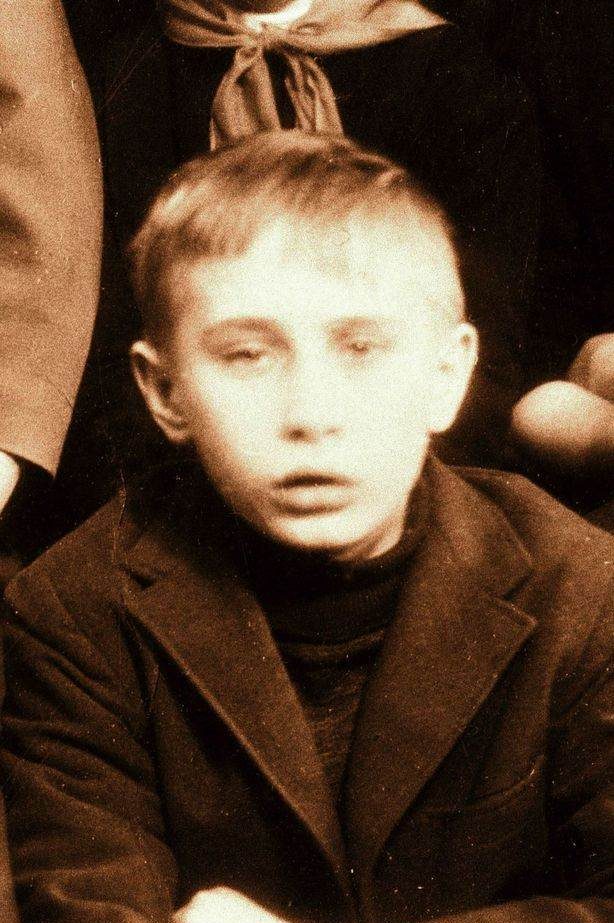
A picture of Vladimir Putin as a child
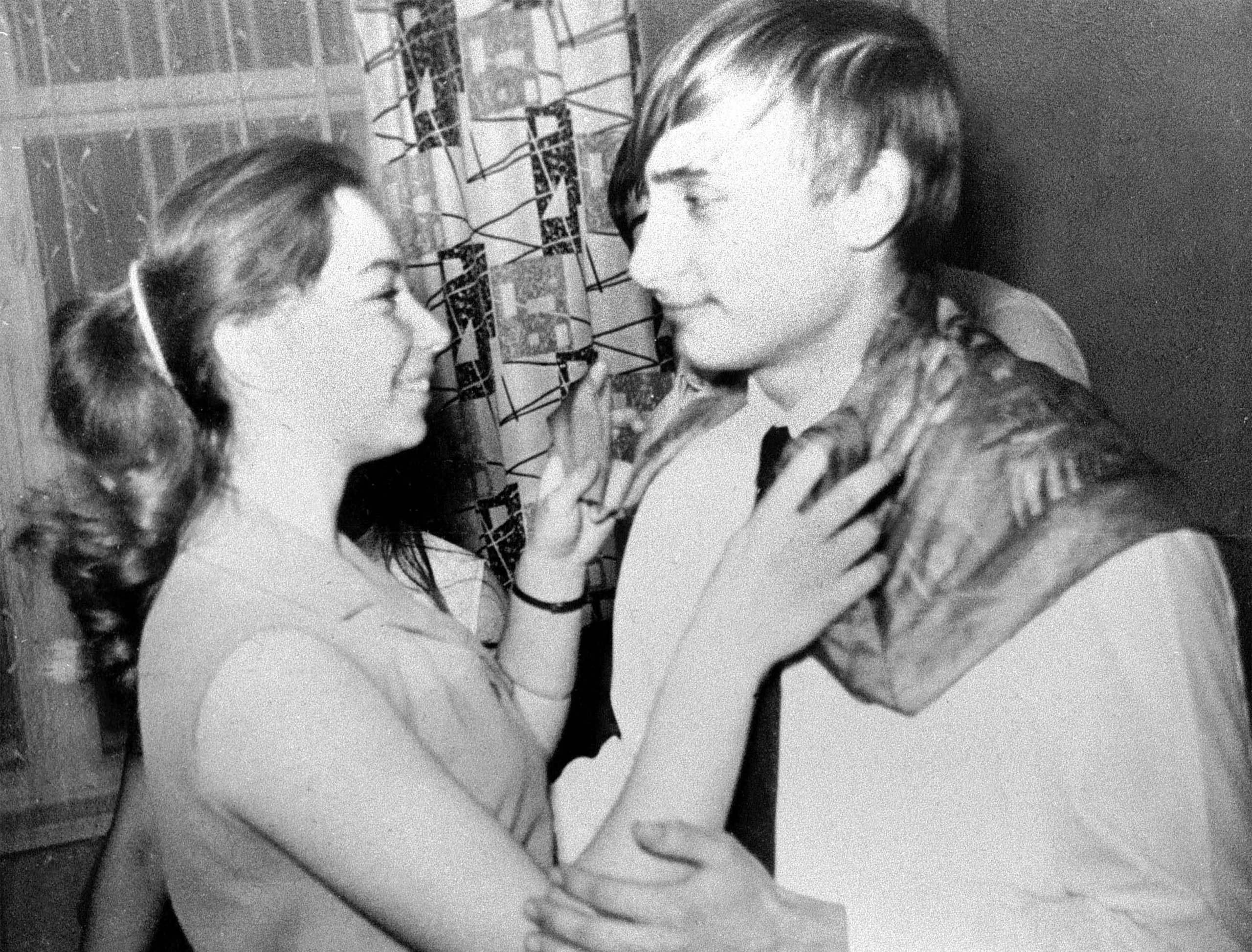
A rare picture of Vladimir Putin as a teenager
Parents, Brothers, and Sisters
His father, Vladimir Spiridonovich Putin (called up in the Soviet Navy), and his mother, Maria Ivanovna Putina (a factory worker), are both Russians.
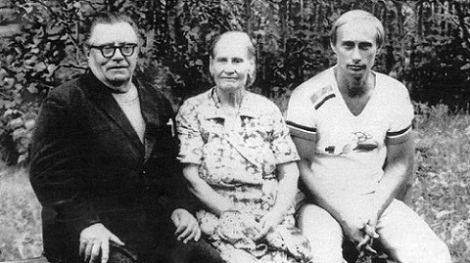
Vladimir Putin with his parents
His grandfather, Spiridon Putin, was a personal cook to Vladimir Lenin and Joseph Stalin.
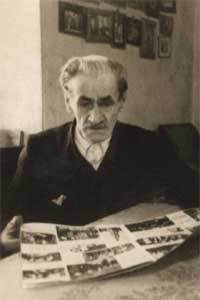
An old photo of Spiridon Putin
Vladimir has no sister. Putin’s brothers are Albert Putin (who died in infancy) and Viktor Putin (who died during the siege of Leningrad from diphtheria during World War 2.)
He had a cousin at the Moscow-based Master Bank, Igor Putin, who was involved in a number of money laundering scandals.
Putin also has two grandchildren, born in 2012 and 2017.
Relationships/ Affairs, Wife, Children
Vladimir Putin married Lyudmila Shkrebneva on July 28, 1983, and from 1985 to 1990 the couple resided in East Germany. Two daughters were born to the couple; Mariya Putina was born on April 28, 1985, in Leningrad and Yekaterina Putina was born on August 31, 1986, in Dresden, East Germany.
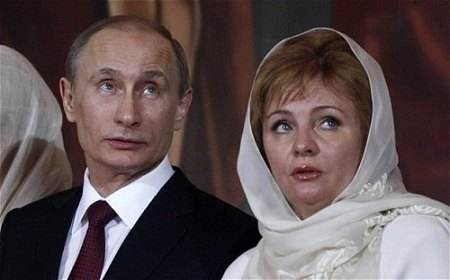
Vladimir Putin with his ex-wife, Lyudmila Shkrebneva
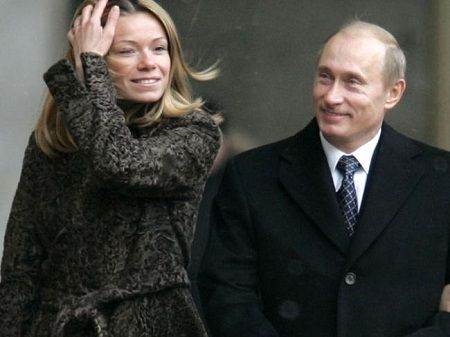
Mariya Putina and Vladimir Putin
In a report published by Proekt Media in November 2020, it was claimed that Putin had another daughter, Elizaveta (known as Luiza Rozova), born in March 2003, with Svetlana Krivonogikh.
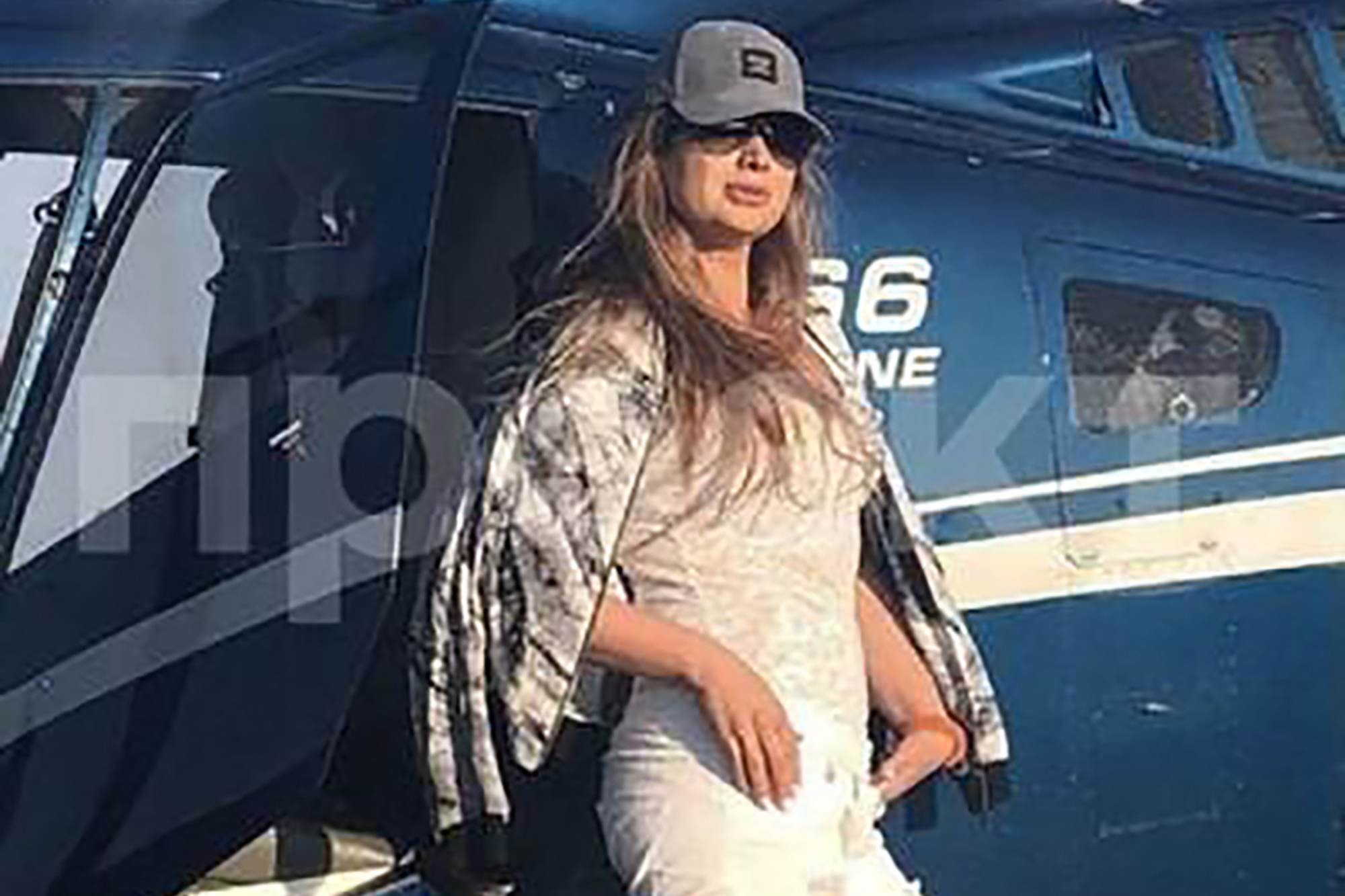
Svetlana Krivonogikh
Moskovsky Korrespondent reported on April 8, 2008, that Putin had divorced Lyudmila and planned to marry rhythmic gymnast and former politician Alina Kabaeva, who is also a former Olympic gold medalist. A few weeks later, the newspaper was shut down for denying the story.
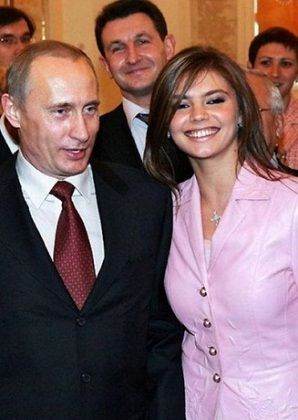
Alina Kabaeva and Vladimir Putin
During this period, Putin and Lyudmila continued to make public appearances together as spouses, while the status of Putin’s relationship with Kabaeva was the subject of speculation. The following years brought frequent reports that Putin and Kabaeva had several children together, but these unsubstantiated rumors were refuted.
Lyudmila and Putin announced that their marriage ended on June 6, 2013, and the Kremlin confirmed that the divorce was finalized on April 1, 2014. Kabaeva reportedly gave birth to a daughter in 2015 and Putin is believed to be her father. According to the media, Kabaeva gave birth to twins in 2019.
Wendy Deng Murdoch, an American entrepreneur, is rumored to be dating Russian President Vladimir Putin. However, she denied it later.
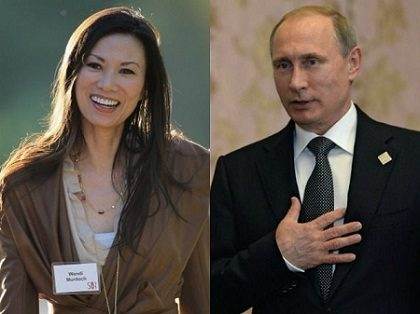
Wendi Deng Murdoch
Carrier
In the September of 1960, Putin joined School No. 193 at Baskov Lane which was near his place of residence. He wasn’t yet a member of the Young Pioneer organization yet. He showed interest in sambo and judo when he reached 12 years of age. He would often like to spend his time reading authors such as Karl Marx, Friedrich Engels, and Lenin. Putin studied German at Saint Petersburg High School 281 and speaks German as a second language. He graduated from Leningrad State University with a law degree in 1975.
Career in KGB
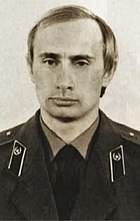
Vladimir Putin during his time in KGB
After his training at the 401st KGB school in Okhta, he became a counterintelligence officer at the second general directorate, before being assigned to the first general directorate. The Red Banner Institute was founded by Yuri Andropov in Moscow in September 1984 with the aim of continuing Putin’s training. His cover identity was that of a translator during his stay in Dresden, East Germany between 1985 and 1990. There is controversy surrounding this period of his career.
A Russian-American (Masha Gessen) wrote a biography of Putin, stating that “Putin and his colleagues were reduced mainly to collecting press clippings, thus contributing to the mountains of useless information produced by the KGB”.
The communist East German government fell in 1989, so Putin resigned from active service as a KGB agent due to suspicions of his loyalty during the protests in Dresden and earlier, although the Soviet army and the KGB continued to operate in Germany. He returned to Leningrad and worked for about three months for the Department of International Affairs of Leningrad State University under Vice-Rector Yuriy Molchanov. During the 1991 coup attempt against Soviet President Mikhail Gorbachev, Putin claims he resigned with the rank of lieutenant colonel on the second day of the coup.
Political Career
1990-1996: Saint Petersberg
A year after his election to the Russian Supreme Soviet, Anatoly Sobchak appointed Putin as his advisor for international affairs.
After being appointed on June 28, 1991, he became head of the city hall’s foreign relations commission, responsible for promoting international relations, registering foreign investment, and promoting foreign investment. Putin retained his position as head of the Foreign Relations Committee until 1996, despite investigators’ recommendation that he be fired. Other governments and political posts in Saint Petersburg were held by him between 1994 and 1996.
In March 1994, Putin was appointed to the post of First Deputy Chairman of the Government of Saint Petersberg.
1996–1999: Career in Moscow
Putin had led Sobchak’s election campaign and lost his re-election bid in St. Petersburg in June 1996. His post in the city administration ended with his resignation. When he moved to Moscow to work in the presidential property management department headed by Pavel Borodin, he was appointed deputy head of the department. It was there that he held that position until March 1997.
Putin was appointed Deputy Chief of the Presidential General Staff by President Boris Yeltsin on March 26, 1997. He held this position until May 1998, and he also served as Director of Main Control of the Property Management Department presidential elections (from June 1998 to May 1999).
Vladimir Putin was appointed First Deputy to the Presidential Chief of Staff for the Regions on May 25, 1998, succeeding Viktoria Mitina; on July 15, he was appointed head of the commission for the preparation of agreements on the delimitation of regional powers and head of the federal center reporting to the president, replacing Sergey Shakhray.
Yeltsin appointed Putin director of the Federal Security Service (FSB) in July 1998, which is the main intelligence and security organization of the Russian Federation, succeeding the KGB.
1999: Becoming the Prime Minister for the first time
Putin was named one of the first three Deputy Prime Ministers by President Yeltsin on August 9, 1999, and later that day was named Acting Prime Minister of the Government of the Russian Federation. The former Russian president also said he wants Putin to succeed him. Later that day, Putin announced his candidacy for the presidency.
His nomination as prime minister was approved by the State Duma with 233 votes in favor (against 84 against, 17 abstentions), making him Russia’s fifth-shortest prime minister for 18 months.
Although he has no formal affiliation with any party, Putin pledged his support for the newly founded Unity Party, which won the second-highest percentage of the popular vote (23.3%) in the elections to the Duma in December 1999, and endorsed Putin.
1999-2000: Acting Presidency
According to the Russian Constitution, when Yeltsin suddenly resigned on December 31, 1999, Putin became acting President of the Russian Federation.
The first presidential decree signed by Putin dates from December 31, 1999, titled “On guarantees for the former President of the Russian Federation and members of his family”. He was thus assured that “the corruption charges against the outgoing president and his relatives” would not be filed. The focus was on the Mabetex corruption case, in which members of Yeltsin’s family were involved.
Upon Yeltsin’s resignation, presidential elections were held on March 26, 2000, three months after his opponents had planned to hold them in June 2000. Putin won the first round with 53% of the vote.
2000-2004: First Presidential Term
The inauguration of President Putin took place on May 7, 2000. Mikhail Kassianov was appointed as Prime Minister by President Putin.
2004-2008: Second Presidential Term
In the March 14, 2004 elections, Putin won 71% of the vote, giving him his second term as president.
After the collapse of the Soviet Union, the period of nearly 10 years before Putin’s rise was a time of turmoil in Russia. Several national priority projects aimed at improving Russia’s health system, education system, housing system and agricultural sector were introduced in 2005.
Politkovskaya was shot dead on Putin’s birthday, October 7, 2006, in the lobby of her building, after several months exposing corruption in the Russian military and her conduct in Chechnya. Following Politkovskaya’s death, international critics accused Putin of failing to protect Russia’s independent media.
The government was dissolved by Putin at the request of Russian Prime Minister Mikhail Fradkov on September 12, 2007.
Based on preliminary election results, United Russia won 64.24% of the popular vote in the State Duma race in December 2007. It was widely considered that United Russia’s victory in the December 2007 elections was a sign that the then-Russian rulers and their policies were popularly supported.
2008-2012: Prime Minister for the second time
According to the Constitution, Putin was not allowed to run for another consecutive term. Dmitry Medvedev was the newest member of the administration and was elected to succeed him. Immediately after the presidency was handed over to Medvedev on May 8, 2008, Putin was appointed Prime Minister of Russia, thus retaining his power.
On September 24, 2011, at the United Russia Congress in Moscow, Medvedev formally offered to Putin to run for president in 2012. Putin accepted the proposal.
2012-2018: third presidential term
On March 4, 2012, Russian President Vladimir Putin won the first round of the presidential election, with 63.6% of the vote despite numerous hypotheses of electoral fraud.
Demonstrations against Putin took place during and immediately after the presidential election.
The inauguration of Putin’s presidency took place in the Kremlin on May 7, 2012. During the first 24 hours of his presidency, Putin issued 14 presidential decrees, often referred to as “May decrees” in the media.
Russian-Ukrainian conflict
On October 17, 2014, Russian President Vladimir Putin met with Ukrainian President Petro Poroshenko, German Chancellor Angela Merkel, and French President François Hollande.
Several Russian military incursions took place on Ukrainian territory in 2014. Russian soldiers without insignia established control of strategic positions on the Ukrainian territory of Crimea. Russia annexed the Republic of Crimea and the city of Sevastopol. Pro-Russian protests against the legislative actions of the Ukrainian Rada in Ukraine’s Donbas region eventually escalated into a conflict between the Ukrainian government and Russian-backed separatist groups from the self-proclaimed people’s republics of Donetsk and Luhansk. In early September, the Ukrainian authorities attributed the defeat of the Ukrainian forces to the incursion of the Russian army.
A large movement of equipment and troops from Russia to separatist-controlled areas of eastern Ukraine was reported by the Ukrainian military in November 2014.
Intervention in Syria
In response to an official request for military assistance from the Syrian government against rebels and jihadist groups, President Putin authorized Russian military intervention in the Syrian civil war on September 30, 2015.
Russian interference in the 2016 US elections
An intelligence community assessment in January 2017 said the U.S. intelligence community is confident that Putin personally ordered an influence campaign aimed at damaging Hillary Clinton’s chances for the presidency and building support for Donald Trump. Russia has denied any interference in the US presidential election that Trump and Putin have claimed. Putin then claimed that interference is “theoretically possible” and can be perpetrated by “patriotic-minded” pirates, and on another occasion suggested that not only Russians, but also Ukrainians, Tatars, and Jews of Russian nationality could be responsible. The Russian president continued to make similar attempts in the 2020 US election.
2018–present: Fourth presidential term
Over 76% of voters voted for Putin in the 2018 presidential election. His fourth presidential term began on May 7 and runs until 2024. Dmitry Medvedev was asked to form a new government on the same day as Putin. Russia hosted its first FIFA World Cup on June 14, 2018. President Putin opened the tournament.
As the country’s regional elections took place in September 2019, Putin’s administration interfered in their results and eliminated all opposition candidates.
The resignation of Dmitry Medvedev and his government came after Vladimir Putin delivered his speech to the Federal Assembly on January 15, 2020. President Putin has proposed constitutional amendments that would extend his powers far beyond his term as president.
Putin nominated Mikhail Mishustin, head of the country’s Federal Tax Service, as prime minister the following day. The next day, the State Duma confirmed his appointment to the post. By decree of Putin, he was then appointed prime minister. There has never been a time in history when a prime minister was confirmed without dissenting votes. Vladimir Putin was presented with the Cabinet structure proposed by Mishustin on January 21, 2020.
During the Covid-19 pandemic
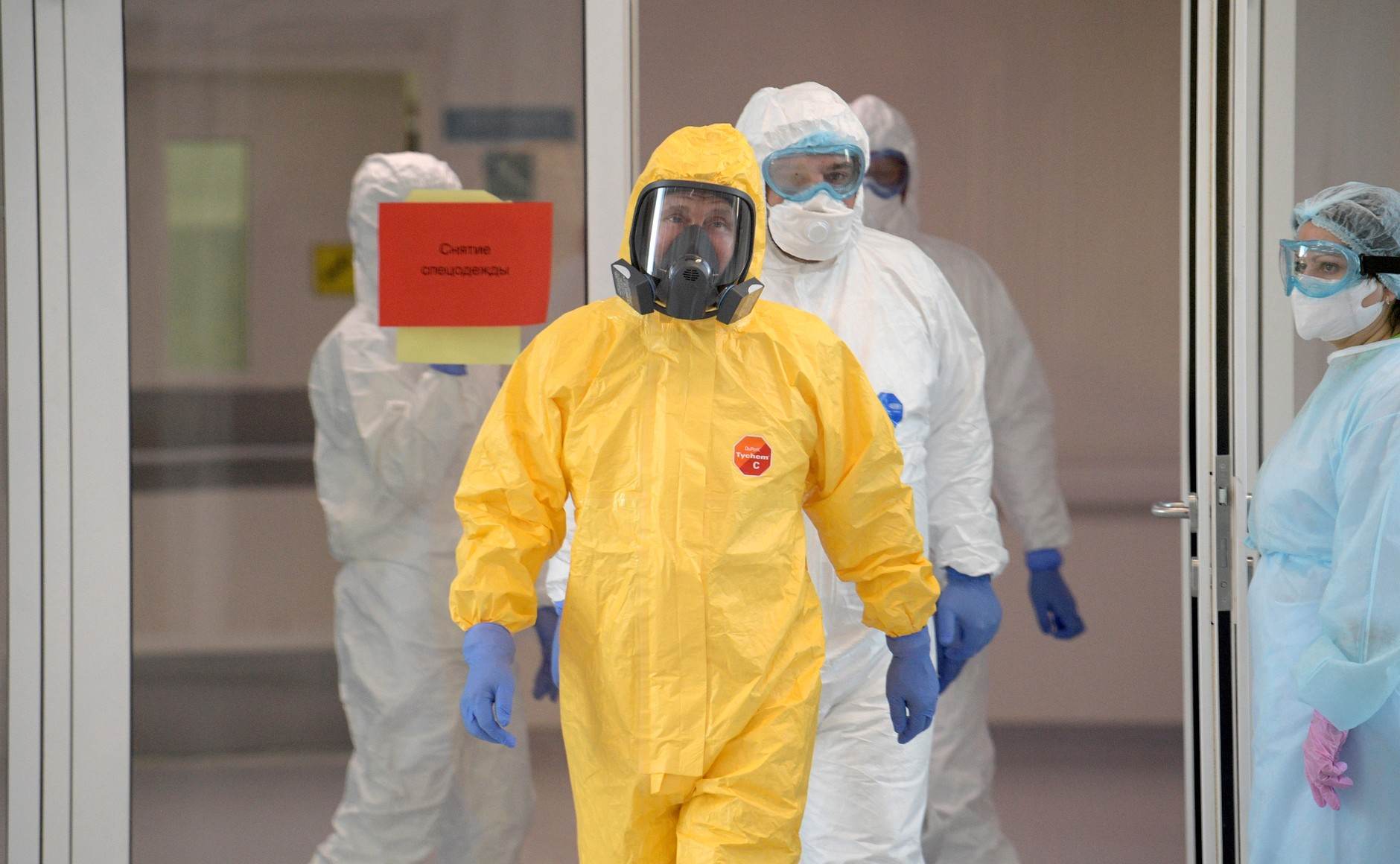
Putin (wearing the yellow hazmat suit) visits coronavirus patients at a hospital in Moscow, March 24, 2020
President Putin was instructed to form a State Council task force to combat the spread of the coronavirus on March 15, 2020. Moscow Mayor Sergei Sobyanin was appointed as head of the group by Putin.
The Russian military has been ordered to send military medics, special disinfection vehicles, and other medical equipment to Italy, the country hardest hit by the COVID-19 pandemic. After speaking with Italian Prime Minister Giuseppe Conte on March 22, Putin arranged for military doctors and other equipment to be sent to Italy.
Constitutional referendum and amendments
Vladimir Putin signed a decree on July 3, 2020, to formally insert constitutional amendments into the Russian constitution to allow him to serve two additional six-year terms. On July 4, 2020, the changes came into effect.
Former Russian presidents were granted lifetime immunity from prosecution on December 22, 2020, by President Putin.
2021–22 Russian-Ukrainian crisis
A military exercise with NATO forces was conducted in September 2021 by Ukraine. The Kremlin has warned that NATO’s growing military presence in Ukraine will cross a “red line” for the Russian leader. Vladimir Putin’s spokesman, Dmitry Peskov, has denied accusations that Russia is preparing for an invasion of Ukraine.
Putin said on November 30, 2021, that the Kremlin considers NATO’s increased presence in Ukraine, in particular the deployment of long-range missiles capable of hitting Russian cities or missile defense systems similar to those of Romania and Poland, as a “red line” issue. Russia has demanded legal guarantees that NATO will not expand eastward or install weapons systems that could threaten its territory nearby. The United States and NATO have rejected this request.
Russian President Vladimir Putin has repeatedly denied that his country is planning to invade Ukraine. Vladimir Putin called these fears “alarmists”.
Autograph
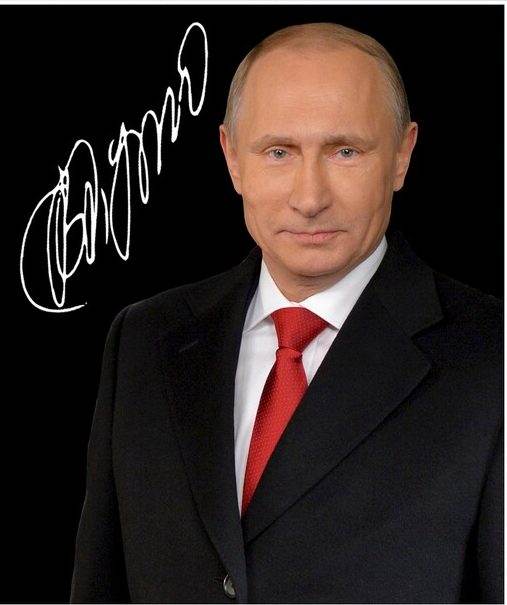
Autograph of Vladimir Putin
Controversies
• Time and time again, Putin has been accused of controlling and influencing Russian media. For example, in 2008, when the liberal newspaper “Moskovsky Korrespondent” reported that Putin planned to marry a rhythmic gymnast named Alina Kabayeva, the editor-in-chief was forced to resign within hours.
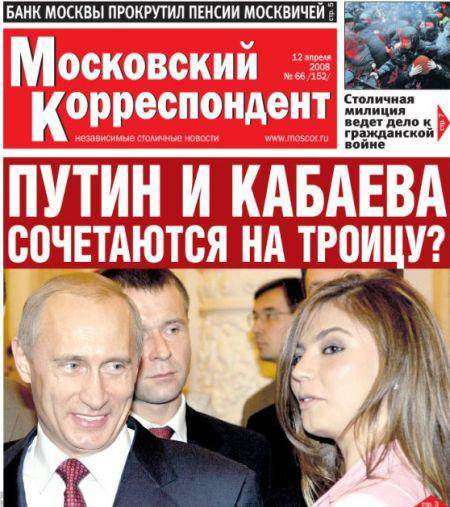
• In July 2016, Putin signed the controversial “big brother law”. According to this law, each telecommunications/internet service provider must store users’ calls, messages, photographs, and videos for six months, as well as metadata for up to three years. Although this law was passed to combat the threat of terrorism, many service providers said that storing so much data would cost them up to 4 times their annual profit. In addition, this bill violates the privacy of Russian citizens.
• In November 2014, during the APEC summit, Putin made a warm gesture by wrapping a shawl around the First Lady of China, Peng Liyuan. Shortly after this video surfaced online, many people began to doubt Putin’s intentions. As China is traditionally conservative about public interaction between unrelated men and women, Putin’s public display of consideration was not taken the way it was meant to be. As a result, the video was completely deleted from Chinese television and the Internet.
• In 2014, the Russian government led by Putin was accused of shooting down a Malaysian passenger plane, MH-17, flying over the troubled region of eastern Ukraine, which killed all 298 passengers on board. Putin denied any wrongdoing and reportedly said, “If MH-17 crashed in Ukraine, it’s Ukraine’s fault.”
• Apparently Putin was also associated with the assassinations of former Russian spy Alexander Litvinenko and rival politician Boris Nemtsov.
• Vladimir Putin has strained relations with the United States by helping a wanted American donor escape US authorities. Edward Snowden leaked classified information about the US government’s collection of personal customer data in 2013. After fleeing the United States, Snowden traveled from country to country seeking asylum until the United States canceled his passport while he was in Russia. Vladimir granted Snowden asylum and gave him the opportunity to apply for citizenship in the future.
Favorites
Band: The Beatles, Lyube
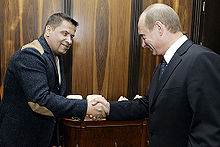
Vladimir Putin shakes hand with the member of Lyube
Beatles’ Member: Paul McCartney
Singer: Anna Netrebko
Color: Teal
Books: Leo Tolstoy’s War and Peace, The Russian Fairy Tale Kolobok, Samuil Marshak’s The Twelve Months, and Antoine de Saint-Exupéry’s The Little Prince
Authors/ Poets: Mikhail Lermontov, Alexandre Dumas, Ernest Hemingway, Ivan Turgenev, Omar Khayyam, Sergei Yesenin
Film: Chapev (1934)
Drinks: Green tea and herbal tinctures. “To be exact, I don’t drink tea, but Altai herbs brewed in boiling water.” He drinks coffee
Musicians: Bach, Beethoven, Mozart, Rachmaninov
Restaurants: New Island, Saint-Pétersbourg ; Tsarskaya Okota et Pivnushka, Moscou
Icecream Flavor: Pistachio
Net Worth
Putin’s wealth was estimated to be around 3.7 million rubles ($150,000) in bank accounts, a 77.4 square meter private apartment in St. Petersburg, and various other assets during the 2007 parliamentary elections. Putin reported an income of 2 million rubles (about $82,000) for 2006 and an income of 3.6 million rubles ($113,000) in 2012.
Putin was photographed wearing a number of expensive wristwatches, collectively worth $700,000, nearly six times his annual salary. Peasants and factory workers sometimes received watches worth thousands of dollars from Putin.
According to Russian opposition politicians and journalists, Putin controls a multi-billion dollar fortune through his successive stakes in a number of Russian companies. In the opinion of a Washington Post editorial, “Putin may not technically own those 43 planes, but, as Russia’s sole political leader, he can act as he does.”
There is uncertainty over the precise sum of Putin’s wealth, and the assessment by the Director of US National Intelligence is apparently not yet complete. However, with the pile of evidence and documents in the Panama Papers and in the hands of independent investigators such as those cited by Dawisha, Polygraph.info finds that Danilov’s claim that Western intelligence agencies have not was able to find evidence of Putin’s wealth to be misleading — Polygraph.info, “Are ‘Putin’s billions’ a myth?”
Garry Kasparov said, “[Putin] controls enough money, probably more than any other individual in the history of the human race”.
Residencies
Putin has lived in various official residences across the country as president and prime minister. Residences include the Moscow Kremlin, Novo-Ogaryovo in Moscow Oblast, Gorki-9 near Moscow, Bocharov Ruchey in Sochi, Dolgiye Borody in Novgorod Oblast, and Riviera in Sochi.
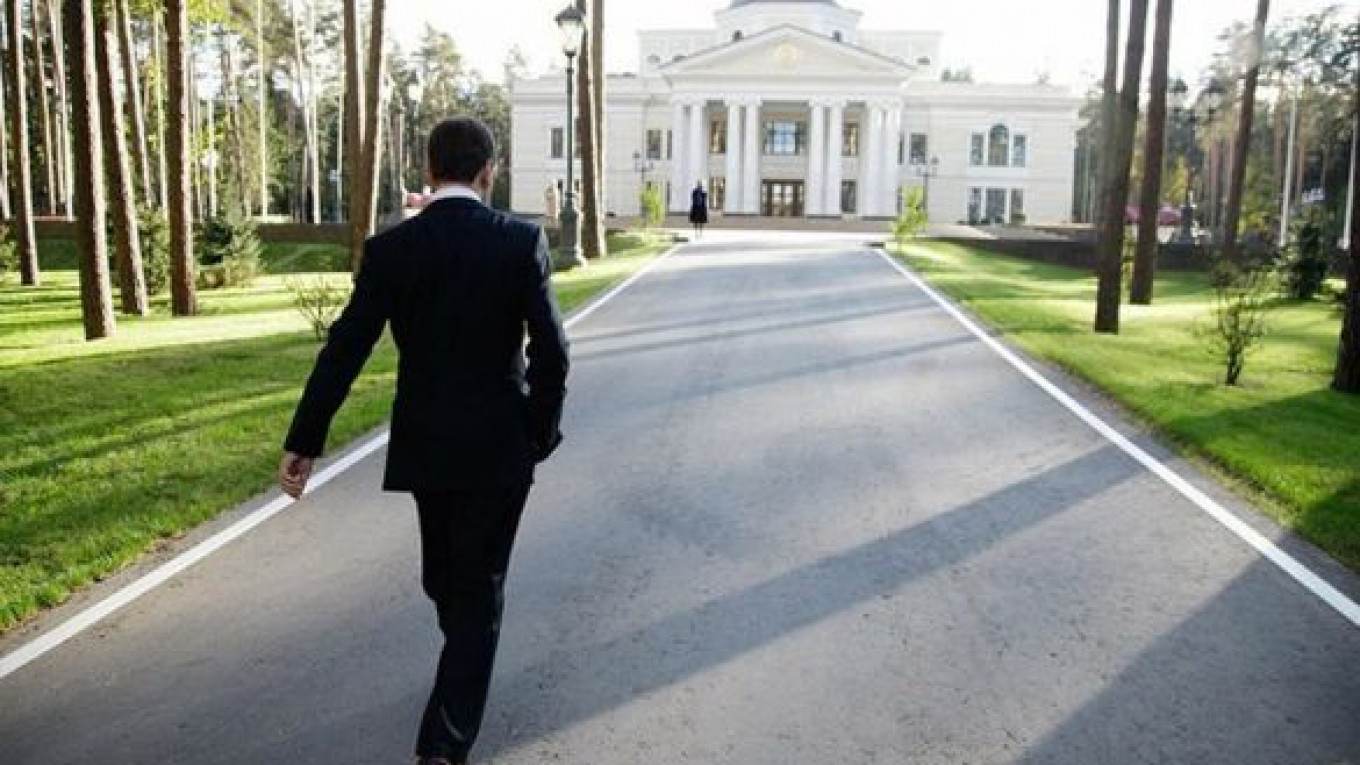
Gorki 9
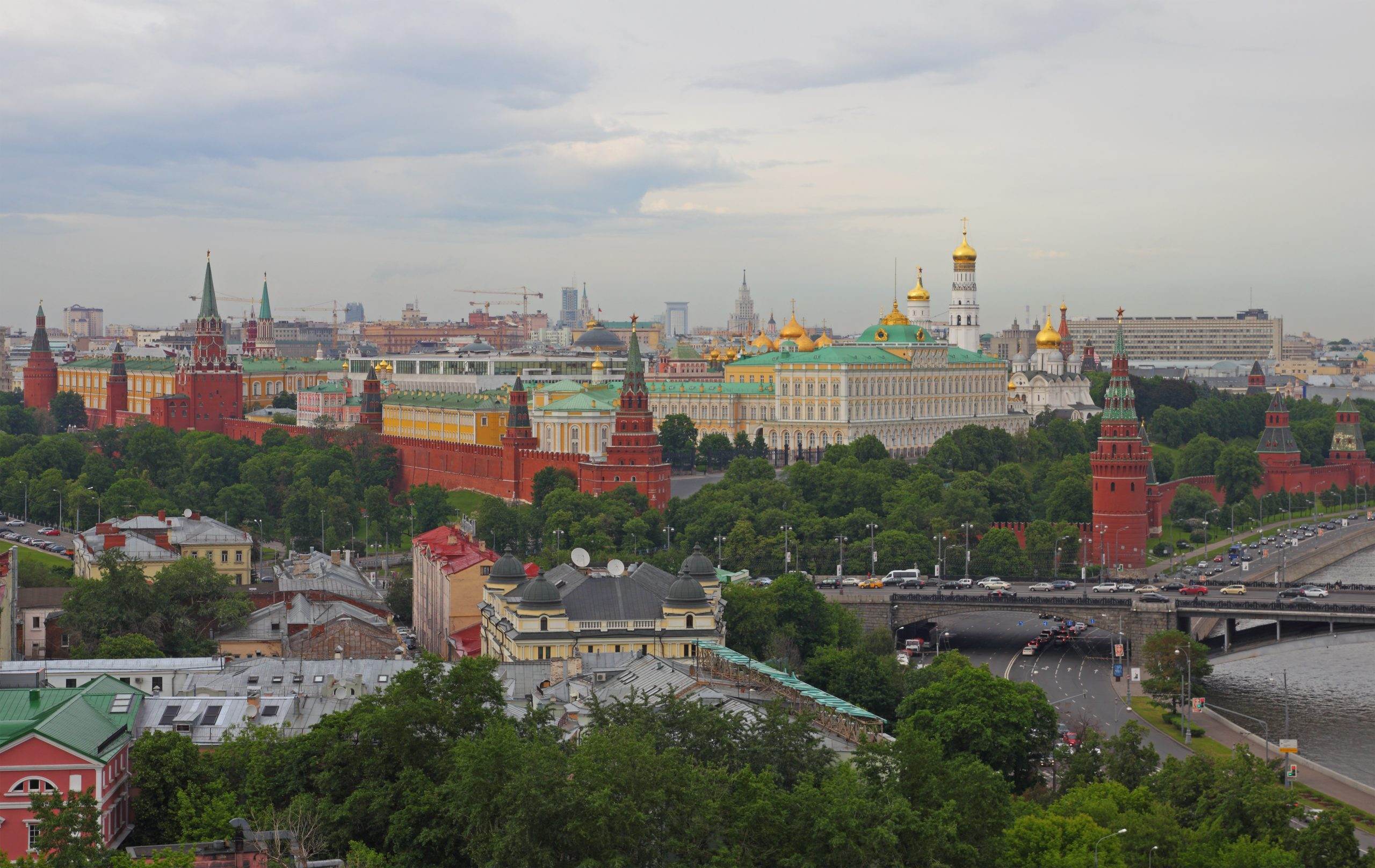
Kremlin de Moscou
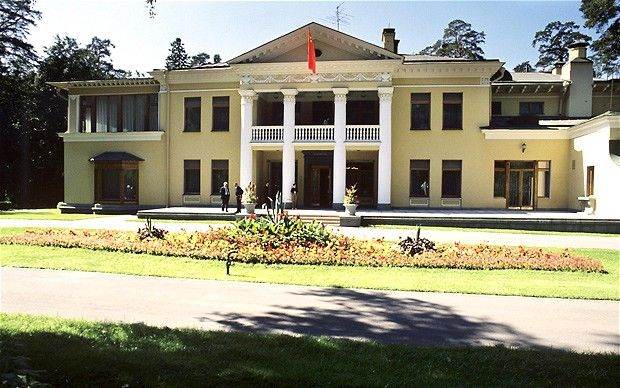
Novo Ogaryovo
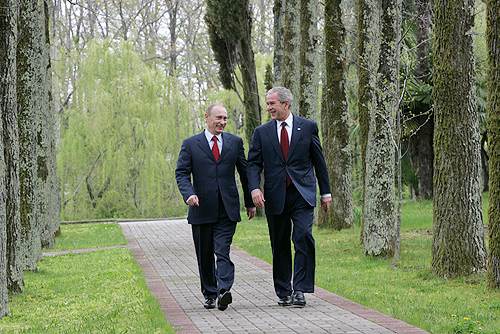
Bocharov Ruchey
Personal residences
As soon as Putin returned from KGB service in Dresden, East Germany, he built a dacha at Solovievka on the eastern shore of Lake Komsomolskoye on the Karelian Isthmus in the Priozersky District of Leningrad Oblast. , near St. Petersburg. Immediately after the dacha burned down in 1996, Putin built a new one identical to the original and was joined by a group of seven friends who built dachas nearby. They registered their fraternity as a cooperative society in 1996, renaming it Ozero (“Lake”) and turning it into a gated community.
Currently, construction of “Putin’s Palace”, an estimated $1 billion Italian-style mansion, is underway near the Black Sea village of Praskoveevka. Putin said the mansion, built on state-owned land with three helipads, a private road paid for with public funds, and guarded by Kremlin guards, was built for Putin’s private use. On January 19, 2021, two days after Alexei Navalny was arrested by Russian authorities upon his return to Russia, a video investigation of him and the Anti-Corruption Foundation (FBK) was released accusing Putin of using fraudulently obtained funds to build the estate in what he called “the biggest bribe in the world”. In the survey, Navalny said the estate is 39 times larger than Monaco and cost more than 100 billion rubles ($1.35 billion) to build.
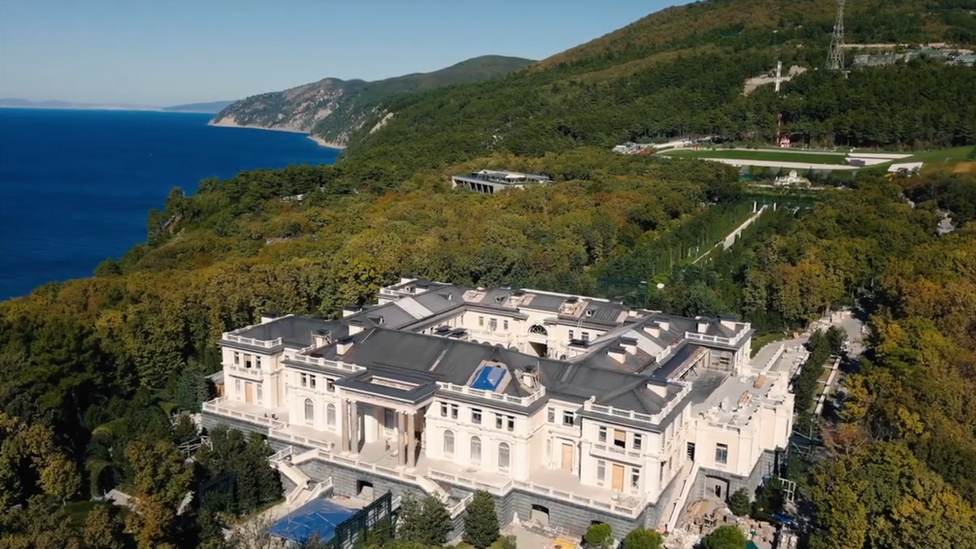
Putin’s Palace
Bike and Car Collection
Putin drives a yellow Lada Kalina, an ivory 1956 Volga GAZ-21, and a black Niva. He even asked then-US President George W. Bush to take command of the Volga when he visited Russia. Among his non-Russian cars are an armored Mercedes S 600 Guard Pullman and a Mercedes Geländewagen.
Facts/ Anecdotes
- He was named Time Person of the Year in 2007. Time’s Most Influential People list ranked him #1 in 2015.

Vladimir Putin on the cover of The Times magazine, 2007
- From 2013 to 2016, Forbes annually ranked him as the most powerful individual in the world. In 2018, Forbes ranked him the second most powerful individual.

Vladimir Putin tops the Forbes’ list of the most powerful people
- Many of Putin’s aphorisms and slogans are known as Putinism.
- Vladimir Putin is known for his sharp, rough language, often alluding to Russian jokes and folk sayings.
- The Russian president sometimes uses criminal jargon (called “fenya” in Russian), but not always correctly.
- Putin portrays himself as an outdoorsman, athletic and tough by participating in extreme sports and handling wild animals, part of a public relations approach that, according to Wired, “deliberately cultivates the image of super-macho and responsible hero”. Kremlinologists have accused Putin of trying to create a personality cult around him, which the Kremlin denies. In 2007, the tabloid Komsomolskaya Pravda published a large photo of a shirtless Putin vacationing in the Siberian mountains. Putin’s activities have been criticized as staged; outside of Russia, his macho image has been parodied. Putin is thought to be hampered by his height, which has been estimated at between 155 and 165 centimeters (5 ft 1 in and 5 ft 5 in) but is usually given as 170 centimeters (5ft 7in).
- Putin is the subject of many songs, and his name and image are widely used in advertisements and product branding. You can find Putin branded products like Putinka vodka, PuTin preserves, Gorbusha Putina caviar, and T-shirts with his image. He was found dead in 2015 after “days of heavy drinking”, although it was later ruled an accident.
- German and English are his mother tongues.
- Black belt in judo, he is a fan of the Beatles.
- Plato, the photographer who took Putin’s picture for Time Magazine, told The Guardian about Putin’s dacha. (It was there that he took Putin’s portrait for Time.) According to the photographer, the dacha is located “in the middle of a dark Gothic forest outside of Moscow.” He said that once he arrived at the dacha, “there were snipers everywhere and three or four feet of snow; it was like a scene from a cold war movie.”
- Putin enjoys watching football and supports FC Zenit Saint Petersburg. He is also interested in ice hockey and bandy. At the age of fourteen, Putin switched from judo to sambo after practicing judo for 11 years. In Leningrad (now Saint Petersburg), he won competitions in both sports. He obtained the eighth dan black belt in 2012, becoming the first Russian to obtain this status. He also practices karate. His books include Judo with Vladimir Putin in Russian and Judo: History, Theory, Practice in English (2004). Benjamin Wittes, a black belt in taekwondo and aikido and editor of Lawfare disputes Putin’s martial arts skills, arguing that there is no video evidence of him showing remarkable skills in judo.
- After the terrorist attacks of September 11, 2001, Putin offered Russian assistance to the United States by allowing the United States to use its airspace and joining the United States in search and rescue missions. When the United States focused on eliminating Saddam Hussein, however, that support shifted to the opposition. Russia, Germany, and France were not in favor of the plan.
- Ice cream – especially pistachio ice cream – is always at the top of her list of favorite foods. Putin once served ice cream to executives at public appearances and even gave some to Chinese General Secretary Xi Jinping, sparking a craze for Russian ice cream in China, despite the relatively affordable price of Russian desserts compared to others. Despite all of this, however, and despite his obvious love of milk, Putin refuses to be served dairy products on the go.
- In 2014, Vladimir Putin and Edward Snowden were nominated for the Nobel Peace Prize. Putin was nominated for his peaceful solution to Syria’s use of chemical weapons. His friendship with the President of Syria, Bashar al-Assad, is probably what contributed to his success. Putin persuaded Assad to peacefully surrender Syria’s arms instead of violently intervening.
- The softer side of Vladimir Putin shows his love and care for animals. Besides having a small pack of dogs at home, he goes out of his way to help search for tigers, polar bears, dolphins, and cranes. He also lobbies for laws guaranteeing better treatment of animals. Petting zoos are banned from shopping malls and restaurants, the killing of stray animals is prohibited, and pets must be properly cared for under the Responsible Animal Care Act.
- As a result of all of Vladimir Putin’s achievements, he and his wife divorced in 2013. Lyudmila, Vladimir’s wife, has been with him since he entered politics in 1983. Lyudmila said they do not see each other often, and Vladimir is consumed with work. According to Vladimir, she put up with him for almost nine years and couldn’t take it anymore.
- He caught a 46-pound pike on a fishing trip to Siberia in 2013, making it one of the biggest catches in the world. (Fishermen argued that the actual weight of the fish was probably half.)
- While hanging out with marine biologists in 2010, Putin took aim at a gray whale. By temporarily immobilizing the whale, the scientists hoped to collect skin samples for their study of the species. Putin’s goal was just about perfect: “I got it on the fourth try,” he told reporters.
- Vladimir Putin oversees research programs on a variety of mammals. He symbolically freed a West Asian leopard from its cage in an outdoor enclosure at a wildlife sanctuary near Sochi in May 2010. A few naysayers claimed the animal was injured during the photoshoot, but Putin’s spokesperson denied this.
- To investigate a 140-year-old shipwreck, Putin sank 200 feet underwater in a submersible in 2013.
- He even managed to score a goal against a Russian national team goalkeeper! (This guy was definitely playing his best.)
- In 2012, Putin competed in an arm-wrestling match, scaled a rock climbing wall, and attempted to bend a frying pan in half at a Kremlin youth camp. (No word on whether he succeeded.)
- The Russian president drove a Renault Formula 1 racing car on a Saint Petersburg track in 2010, reaching speeds of up to 150 miles per hour. He wore a helmet emblazoned with the Russian national symbol, a double-headed eagle, during his test drive. Safety first, guys.

Vladimir Putin driving a Renault Formula 1
- Because they are so patriotic, the Russian “Night Wolves” biker gang are sometimes referred to as Putin’s “Hell’s Angels”.

Logo of Night Wolves
- In Russian tabloids, Putin has been linked to former Olympic gymnast Alina Kabayeva since 2008, but both have denied the relationship. Kabayeva, who is known for her incredible flexibility, was one of the latest torchbearers for Putin’s favorite project, the Sochi Winter Games.
- Russian-Italian jewelry brand Caviar Perna Penna has made a gold-plated Apple Watch, which features the Moscow skyline and the double-headed eagle from Russia’s coat of arms. With a price of 3,073 dollars (197,000 rubles), only 999 units of the “Putinwatch” were produced.
- Playing with dogs is the Russian president’s favorite pastime. After holding a national naming contest, he named his Bulgarian Sheepdog Buffy. Yume is her other dog, an Akita Inu. He received most of his pets from others, including a goat named Skazka, a dwarf horse named Vadik, and even a small Siberian tiger.

Vladimir Putin playing with his pet dogs

Vladimir Putin holding a dog
- Putin likes “active leisure” such as fishing, horseback riding, rafting, scuba diving, skiing, and ice hockey. He also trains in an outdoor gymnasium where he does intense bodybuilding.
- As a child, he was an atheist, but after two major accidents in the 1990s – his wife’s car accident and a house fire – he became a Christian. He is now a devout member of the Russian Orthodox Church.
- The Russian President never misses an opportunity to promote sports. He signed a deal with Bernie Ecclestone in 2010 to bring F1 racing to Russia for seven seasons, from 2014 to 2020.
- His most expensive watch is a $500,000 Tourbograph’Pour Le Mérite from A. Lange & Söhne, with an 18-karat gold case, silver dial, crocodile skin strap, and sapphire crystal. These watches are only worn on the right wrist so that the crown does not rub against his wrist.
- Putin flew a light-powered hang-glider aircraft to the Yamal Peninsula to drive captive-bred Siberian cranes on a migration route in 2012.
- At a charity event in St. Petersburg, Putin performed Fat Domino’s “Blueberry Hill” in front of Sharon Stone, Kevin Costner, and Goldie Hawn. Putin’s spokesperson said he learned the lyrics in his English class.
- Do you think Vladimir Putin had a privileged upbringing? Think again. As Putin himself explains, his parents got married when he was 17. During World War II, her father was drafted into the army. Finally, a grenade paralyzed him. (He survived thanks to a friend who carried him miles through the ice to a hospital.) Putin’s mother found herself trapped in Leningrad, the Soviet-era name for St. Petersburg. , and nearly starved to death during the 900-day Nazi siege. After the war, Putin’s father worked at the Yegorov Wagon Factory. His mother worked sweeping the streets and washing test tubes. The family moved into a communal apartment shared with several families. They had no hot water or bathtub. Their toilets “ran into a stair landing”. He remembers the apartment is cold, crowded, and infested with rats. (Putin and his friends learned to hunt these rats with sticks.)
- During the siege, Putin’s one-year-old brother was taken from his mother. He was buried in an unmarked grave in a children’s home. “My parents told me that children were taken from their families in 1941, and my mother had a child taken from her – in order to save him,” Putin explained. “They said he was dead, but they never said where he was buried.” And this lost son was not the couple’s first. The Times notes that Putin’s first son died in infancy.
- The Los Angeles Times reports that according to Putin’s teachers, he was selected in the ninth grade to attend School No. 281 in Leningrad. The school accepted only the brightest students in town. But Vladimir Putin did not always behave like a model student. According to ABC News, a Russian tabloid claimed to have found Vladimir Putin’s notebook, and it shed light on his behavior at school. The book allegedly revealed that at 11, Vladimir Putin “threw erasers at children”, according to a teacher. Another teacher added that he “didn’t do his math homework”. Still, others added that a young Putin “misbehaved during singing lessons” and “talks in class.” He was also caught passing notes. Putin got into a fight with a gym teacher, who punished him for forgetting his uniform. He even argued with an older student on one occasion.
- The Los Angeles Times reports that, according to Vladimir Putin, his paternal grandfather worked as a cook for Lenin and then for Stalin. As the newspaper notes, “it is unlikely that he would have had such a job without being part of the state security apparatus.”
- Putin became interested in a career in the KGB during the ninth grade. “My impressions of the KGB were based on romantic spy stories,” Putin later said, admitting he had read a novel about a spy in Germany. He went uninvited to the KGB office in Leningrad. There, an agent informed him that the KGB doesn’t take anyone who volunteers, only those it selects. Putin asked how he could prepare. So the agent suggested law school, a path Putin pursued.
- Donald Trump and Vladimir Putin only met in 2017. Time reported in November 2017 that Vladimir Putin and Donald Trump “first met in July at the Group of 20 summits in Hamburg, Germany.” However, the two had probably known each other for years before this encounter. Trump’s claims about his relationship with Putin were outlined in a Washington Post article. The Post reports that Trump “bragged about a relationship with Putin” at a time when “knowing world leaders was an asset.” But Trump backed down from the claims “since being close to Russia and its president became a liability.” Politico, however, reports that Putin was working for the KGB at a time when Trump “appears to have come to the attention of Soviet intelligence.” Trump visited Soviet Russia in 1987. According to Politico, the KGB almost certainly staged the trip.
- Putin could have a net worth of $200 billion! It’s true! A few years ago, the International Business Times reported that Putin might be the richest man in the world with a net worth of $200 billion. That’s 2.5 times more than Bill Gates’ net worth! Forbes responded to the question of why Putin was not on the list saying:
“We value individuals’ assets – including stakes in public and private companies, real estate, yachts, art and money – and consider debt estimates. We also consult with a range of outside experts in various fields (Forbes wrote in 2015), but noted that some people cooperate while others do not,” and added that the magazine excludes “Dictators Who Shoot their wealth entirely because of their position of strength.”
- Vladimir Putin has many nicknames like Pale Moth. Because of his smooth skin, he was also called “Botox.” George Bush called him “Pootie Poot.” He is also called “Puppet Master.” Some of his other names include VVP, Volodya, and Vova.
